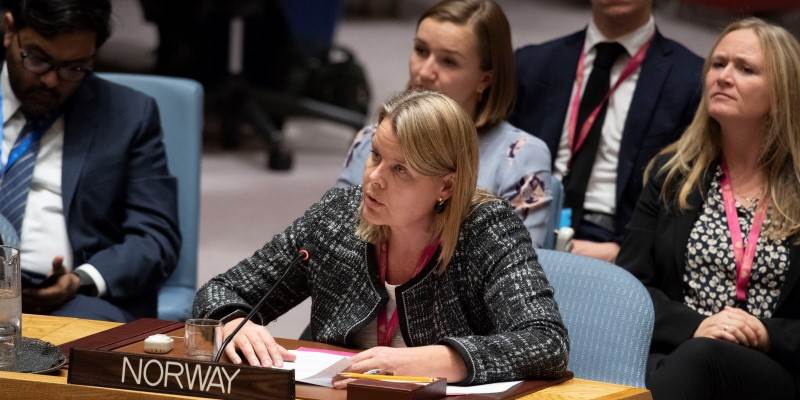I am making this statement on behalf of Denmark, Finland, Iceland, Sweden and my own country, Norway. We thank Bolivia for initiating this debate, and welcome the Secretary General’s annual report.
We are no closer to peace. Women’s security and rights are still threatened, specifically targeted by violent extremists; Women refugees are exposed to violence; women rights defenders increasingly vulnerable. Sexual violence is endemic.
This year’s Nobel Peace laureates expose human suffering that tears people apart and undermines peace. And show us how to respond. Let us!
It has become decidedly harder to ignore women in peace and security efforts:
- The Secretary-General’s strong leadership is crucial.
- The Gender Parity Strategy.
- The independent expert group.
- The national focal points.
- The groups of friends, the networks, including the Women Military Network.
- The increasing number of national action plans and strategies to implement them effectively.
We benefit greatly from the consistent work of civil society. The NGO working group organisations like International Civil Society Action Network, Women’s International League for Peace and Freedom, the Global Network of Women Peacebuilders.
Local women’s groups and organisations in South Sudan, Yemen, Afghanistan, Colombia, Syria and Liberia women have found ways to engage. Their efforts increasingly coincide with those of the UN and regional organisations, as innovative inclusion mechanisms are evolving; sub-commissions, situation rooms, women’s advisory boards. The Women, Peace and Humanitarian Fund.
There is progress. But, as we approach the 20th anniversary of resolution 1325, we aspire for more. Women fill more leadership positions in the UN and elsewhere, but are still underrepresented. At all levels of peacekeeping.
We must connect the peace mediation tracks better and ensure that inclusion mechanisms complement, rather than replace, efforts to include women in the formal track, increase conflict analysis with a gender perspective, and support gender mainstreaming of peace operations.
Our support to UN reform, UN Women, the Department of Political Affairs and and the Department of Peacekeeping Operations is part of our response. As are the women mediator networks.
Regional networks of women mediators are in New York now. To explore opportunities for further cooperation. We must prepare the ground for inclusive processes even in initial peace talks.
Focus as much on women’s inclusion and rights in the implementation of peace agreements as in the negotiation phase.
A gender adviser position should be established in all operational Head Quarters. While leaders bear the ultimate responsibility to deliver. The UN High-Level Seminar on Gender and Inclusive Mediation Processes builds leaders’ competence and capacity.
Men must champion this cause as eagerly as women. We founded the Nordic Centre for Gender in Military Operations to engage with military actors in their work for women, peace and security.
We are your consistent partners for a common peaceful, secure future. Promoting women’s participation is not a gesture to women; it is a question of effectively and sustainably preventing and resolving conflicts.
